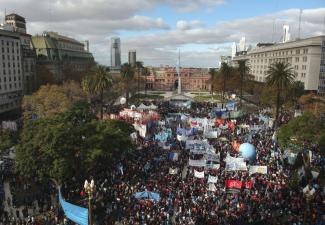Argentina
The budget deficit is the core problem

Argentina’s government has passed its first major economic and fiscal test successfully. The kind of challenges that now lie ahead have been mastered several times in the past. The economy is recovering – slowly, but steadily. I am proud of this development.
It is true that the peso’s exchange rate has fallen, but the decline of other currencies in our world region was almost as steep. The main reason for this trend was the appreciation of the dollar due to rising interest rates in the USA.
The huge budget deficit, which has been burdening Argentina for decades, makes us especially vulnerable in times of capital-market volatility. Because of bad governance in the past, we have become used to the peso being pegged to the dollar. If the exchange-rate changes even marginally, many people are afraid of crisis.
We are not afraid, however. We have ways and means to deal with exchange-rate fluctuations. At no point in recent months were we on the brink of any serious crisis. What happened was that we faced some liquidity and coordination problems, and specific measures had to be taken:
- the central bank had to raise interest rates,
- the government had to turn to the International Monetary Fund for support and
- it had to reduce the budget deficit.
An important milestone was the success of the “Lebacs”, bonds issued by the central bank. In view of declining volatility, it had to issue new Lebacs. Demand was stronger than expected, which showed that the decisions taken by the government and the signals it set were sufficient to restore trust in our economy.
International responses – from Washington to Berlin to the G20 – contributed to stabilisation. The world considers us a reliable partner once more. Over the next three years, the IMF’s $ 50 billion dollar loan will help us to achieve a balanced budget (before debt servicing).
President Mauricio Macri has not backtracked from his optimistic aspirations, even though some doubt they are realistic. In a policy statement two years ago, he promised economic normalisation. This promise has not been broken, and it will not be broken. Macri warns against talking down our nation’s outlook.
One reason for the recent coordination and communication problems was the central bank’s independence, which must be maintained. Moreover, Argentina must reduce the budget deficit. It puts a heavy burden on all citizens, making the country dependent on foreign financing, which means it is vulnerable. That is the core problem.
Our nation needs predictability. We must be sure that uncontrolled government spending will not sink our economy once more. The big challenge is that Argentinians – led by the government – must now solve a problem that has been evident for many decades and that plunged us into crisis after the turn of the millennium.
Today, the public sector accounts for 70 % of the jobs in some provinces. Therefore, we are doing our best to create real jobs, for example, by teaching people the skills that are in labour-market demand. The best social-protection policy is to create employment.
During the turbulences of recent weeks, Argentina’s largest wind farm became operational. The investment costs amounted to $ 3 billion. Moreover, we have gained access to a new market: China has opened its borders for fresh and frozen meat. This means an additional 200 million potential consumers. It also deserves to be mentioned that the demand for organic food is growing around the world and creating additional demand for Argentinian goods.
Real solutions require international cooperation and mutual support. We must ensure that the blessings of progress benefit everyone, including those who have the least. To be fair and equitable, globalisation must be inclusive.
Cornelia Schmidt-Liermann is a member of Argentina’s parliament and belongs to the party of President Mauricio Macri.
csliermann@diputados.gov.ar
http://corneliasl.com.ar/
Twitter: @CorneliaSL








